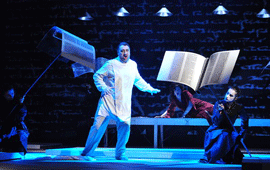> [Archived] Chronicles

'Nabucco' by... Hausvater, with Music by Verdi
(Also) Transferred from the period of the Second World War, the action brings on stage soldiers with machine guns (and also Abigaille carries such a weapon) and Jews locked in cages or taken to 'gas chambers' (and at this moment, some actors enter the stage, apparently naked, but wearing, partially at least, skin tight, flesh coloured costumes) and (again) projecting in the background portraits of Jews who were probably victims of the massacre (it's strange when only a few faces are always being shown, when there must thousands of these types of pictures ?!), images from 'death trains' or from concentration camps; and above all this, projections reminding us without any intention, of the 'kaleidoscope' of our childhood (similar to the ones used in 'Troubadour' from Bucharest, directed by the same Hausvater). All this made up a permanent conglomeration on stage, doubled by these pictures that put excessive weight on everything, tiring the audience who, at an opera, are supposed to listen to music as well… Surprisingly, there were certain mix-ups in maintaining as one the conception as a 'whole', because, for example, the golden crown all the main heroes fight over is entirely out of context; and if every part of the show is preceded by the synagogue prayer image (backed up by the recorded 'sound', carved out of reality), a mark maintained throughout the entire performance, after the final chord from the orchestra, all the performers come back on stage, singing, this time in Romanian, 'the slave's choir', while in the hall, an actor flies an enormous Romanian flag… , and others pass out 'fliers' on which was printed the text with obvious meanings to fight for freedom, to rebel, everything backed-up by carved out projection of elements specific to 'our homeland', mixed with factories and modern neighbourhoods (reminding of the onetime 'Romanian Singing') and, to top it all off, with… Orthodox churches! A mixture that clearly breaks the flow of those three hours filled with Judaic pithiness, the obvious intention being the displacement in the age and the urge to fight for freedom (why, from who?...) here and now. Honestly, I found everything over the limit.
If we are to talk strictly about the musical side and the performance of the soloists, they have performed correctly, they have tried and succeeded in outlining the characters just the way the director imagined, fixing even the complicated use of the trapdoors (which has given us some technical… emotions) and of all the demanding elements, in a perpetual agitation on stage, trying to give life, as best as everybody could, to the difficult arias, duets and ensembles, with more or less quality in their voices. Noteworthy is the fact that besides soprano Madeleine Pascu, guest from the Opera in Bucharest to play the part of Abigaille, the whole cast was comprised from Cluj soloists. So, Fulop Martin was… Nabucodonosor (although, I repeat, Verdi only noted him as Nabucco), Sorin Lupu was Ismaele, Calin Cozma 'took over' the role of Zaccaria (even though in the flier-bill Sorin Draniceaunu was mentioned, but who fell ill), Cristian Hodrea made an impression playing the High Priest (it was specified that he worshiped the god 'Bel' when it's actually Baal… ), Iulia Merca played remarkably good, portraying an expressive and sensitive Feneca, and Florin Pop together with Daniela Muresan-Chisbora completing a balanced cast, but without exceeding expectations. But the choir (trained by Corneliu Felecan) sounded good, and the orchestra persuaded everybody of its quality, conductor being Adrian Morar, confident and efficient, rigorously coordinating the relationship between the pit and the stage, the slight discrepancies being resolved discreetly, overall, the sonority had both brilliance and expressivity, the audience rewarding with lengthy ovations a production which was received by many with reservation (and not only regarding its staging).
Translated by Florina Sămulescu
MTTLC, Bucharest University














